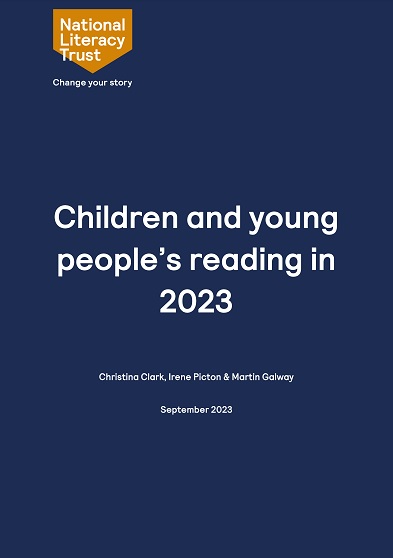Survey reveals marked decline in reading for pleasure in 2023
Posted on Tuesday, September 5, 2023
Category: News

Research into children and young people's reading has recorded a marked decline in reading for pleasure, with fewer than half of all children aged 8-18 years (43%) saying they enjoy reading in their free time, down from a high of 58% in 2016.
The survey, Children and Young People's Reading in 2023, also explores the importance of a child's 'reading environment' - how much support they are given at home - in whether they enjoy reading or not, and it highlights measures to encourage reading, including book recommendations, representation, and book gifting.
Decline in enjoyment among 'core' readers
The survey of 71,400 children and young people by the National Literacy Trust early in 2023 has revealed that fewer than one in three children (28%) aged eight to 18 read daily for enjoyment. While this remains the same as for 2022, the figure stood at 38% when the survey began in 2005, marking a 26% fall in those who read daily.
Part of the decline is due to a fall in reading enjoyment by groups that have traditionally read for pleasure, particularly girls aged eight to 11 years. Indeed the overall number of children aged 8-11 years who said they enjoyed reading in their spare time has fallen by 12% over the past 18 years - from 68% in 2005 to 56% in 2023. This is particularly concerning among an age range, 8 to 11 years, that is considered the 'core' age for children's reading.
The decline in girls' reading enjoyment has resulted in a narrowing of the gap between girls' and boys' reading for pleasure, to 5% in favour of girls, a figure that stood at 11% in 2005.
The survey also shows that the socio-economic background of children and young people continues to impact on their enjoyment of reading, with 24% of children and young people who receive FSMs reading daily, compared with 29% of those who don't. The survey reflects regional differences in reading for pleasure, too, with levels highest in Greater London (52%) and lowest in the East Midlands (40%).
Uplift among older readers
Looking more closely at reading engagement among young people, some 40% of 11 to 16-year-olds say they enjoy reading in their spare time, a figure that has remained consistent among the 11 to 14-year-old group over the past 18 years.
More encouragingly, the percentage of those aged 14 to 16 who enjoy reading in their spare time has increased since 2005, up from 32% then to 41% in 2023, a change that could reflect more engaging, young adult-specific publishing, as well as trends like Booktok, which has provided a new platform for reaching young adult readers.
What will encourage children and young people to read more?
Results from the survey suggest that measures including book recommendations, representation in children's books and gifted books would help to encourage more children to read. The biggest influence in encouraging children and young people to read is having books recommended to them, with 38% or two in five young people saying book recommendations would encourage them to want to read.
Representation also remains very important, with one in three saying that they would want to read books that represent them. One in three children and young people would also read books if they were gifted to them. Hearing their friends and family talk about books would encourage one in four to read more; and seeing someone they looked up to reading or talking about reading would also make them want to read.
Reading environments
Having a quiet space to work, read or take time out is a significant factor in children reading at home; 48% of those who said they had a quiet space at home said they enjoyed reading, compared with 31% who enjoyed reading but who did not have a quiet space to do so. The survey highlights that one in five of the children and young people questioned do not have a quiet space at home, nor their own desk or table to work at.
Encouragement at home
A positive result from the survey is that more children and young people are being encouraged to read by their parents / carers in 2023, with a rise of 8% in children confirming parental engagement since 2022, while there was also a 11% increase in family helping them find something to read. These results suggest that there is a greater awareness among parents and carers of the need to support their children in their reading at home.
The survey also highlights the significance of a supportive environment in whether children read for pleasure; nearly three times as many children and young people who perceived their reading environment to be supportive said they enjoyed reading (63.9%) compared with those who perceived their environment to be less supportive (25.4%), and twice as many read daily in their free time (41.7% vs. 17.7%).
Trends in reading for pleasure
The National Literacy Trust's annual reading for pleasure surveys have been conducted since 2005, but 2023 marks the lowest reading enjoyment levels in its history, with two in five (43%) of children and young people aged eight to 18 years enjoying reading; among children aged five to eight years, this stands at 75%.
Reading enjoyment peaked in 2016, with three in five (58%) of children and young people enjoying reading, but reached a then all-time low in 2020, just before the first Covid pandemic national lockdown. While reading enjoyment levels rose during that period, they fell back in 2022 to 2020 levels, before declining further in 2023 and, in the survey's words, setting 'a new all-time low record for this age group'.
Links for the full report: Children and Young People's Reading in 2023 National Literacy Trust
